#beardless leto
Explore tagged Tumblr posts
Text
Hellenic Polytheism 101

Tips on How To Start Worshipping the Greek Gods!
!Disclaimer! I’ve only started practicing Hellenic polytheism a few months ago! I’m not a professional and while I will try my hardest I’m not gonna get everything right
To many, starting to worship the Greek gods can be daunting. You’ve probably heard a lot about them and maybe don’t know where to start—but never fear—your helpol big brother is here to help you!
Today, I’m going to go over what Hellenic polytheism is, well-known gods, common misconceptions, and some helpful tips!
Before that though, I just want to reiterate that I am not a professional and have only started this journey a few months ago. It’s important to fact-check any information you receive to make sure it’s correct, even if it’s from a credible source.
Alright, let’s start with what Hellenic Polytheism even is! To put it simply, Hellenic Polytheism refers to the religous practice of honoring the gods of ancient Greece. This religion has existed for a very long time but because of the introduction of Christianity the religion is not as big as it was before in ancient Greece. Though, in recent years, the religion has gained popularity and is steadily growing!
Well-known gods:
There are many gods in this religion including The Twelve Olympians, divinities and spirits of nature, underworld deities, and heroes. To keep this simple, I’m just going to talk about some of the 12 Olympians.
The first and probably one of the most well-known gods is Zeus, the sky and thunder god and king of the gods on Mount Olympus-where he and the other 12 Olympians live.
Apollo is the son of Zeus and Leto and the Greek god of the sun, light, prophecy, music, dance, plague, healing, poetry, archery, and much more. He is also the twin brother of Artemis the goddess of the hunt and the moon. He is often depicted beardless and often holding a lyre
Aphrodite is the goddess of love, beauty, passion, and more! She is often associated with lust and fertility. In some myths, she is considered the daughter of Zeus and Dione. However, in other versions, she is said to have been born from seafoam, emerging fully formed from the sea. Her son Eros, the god of love, is a significant figure in many myths.
Hermes is the god of travel, herd, luck, speed, trade, and more! He is the son of Zeus and the Pleiad Maia. Hermes is also known to be the messenger god and quite mischievous
Artemis, the twin sister of Apollo and the daughter of Zeus and Leto, is the goddess of the hunt, wild animals, nature, chastity, vegetation, childbirth, and the moon! She is often depicted with a bow and arrow and accompanied by an animal (usually a deer or sometimes hunting dogs) by her side. As one of the three virgin goddesses Artmis took a vow of chasity. Additionally, she is also the protector of childbirth of young children,
Hera is the revered queen of the gods and the wife of Zeus. She is the goddess of family, marriage, childbirth and women. Known for her jealousy and vengeance, especially towards Zeus and his many lovers and their offspring. Her children are Ares, Hephaestus, and Hebe. Eileithyia is also sometimes considered to be one of Hera’s children.
There are more Olympians but to keep this post short-ish I’m going to stop here. But I encourage you to do some independent research and look more into the gods!
Common Misconceptions
There are a lot of misconceptions about Hellenic Polytheism so I’m just going to go over some of them and clear things up!
Myths:Myths are very misunderstood in the helpol community particularly when taken literally. The myths-crafted by ancient men, were never meant to be taken literally. We value myths because it’s a way to see how the gods were veiwed back then and worshipped. They’re also just fun to read! Think of it like fanfiction (if you’re into that sorta thing): you wouldn’t start hating a character in a show just because of how they were written in a fanfiction, that would be irrational. The myths are simply stories about the gods created by men of the past. The gods are not their myths!
Candle Divination: Candle divination is a form of divination that interprets a flame and it’s movements to communate and understand messages from the gods. But, this form of diviniation is unreliable and you will give you false signs and readings. It’s best to not use this method and stick to more reliable ones like, tarot, dice or oracle. I’ll talk more about divination and different methods in another post!
No sins: In Hellenic Polytheism the concept of sins actually doesn’t exist. While there are things you can do to offend the gods, a sincere apology should be enough for forgiveness-just don’t repeat the mistake again. The gods will not be angry if you can’t make an offering everyday, they will not be angry if you can’t talk to them everyday, they will not be angry if you make a mistake. The gods know that you are only a mortal and mortals make mistakes. So don’t sweat it
General Tips
First, if you are in a situation where you can’t make a physical altar, I recommend using a box, like a shoe box. You can add your offerings in this box and anything else you think the god you’re worshiping would like! Remember, you don’t have to make an altar if you don’t want to, alters are not requirements, just useful tools to have! Don’t feel pressured to make one especially if you’re unable to! The gods won’t be mad
Dive into plenty of books! Books offer a lot of useful information about the gods and are just a nice thing to invest in. I recommend reading Mythology by Edith Hamilton-It’s a great book that provides really fascinating and interesting information about the gods and their myths!
If you’re unable to make an altar there are other ways to make offerings to the gods. One of these ways is devotional acts. For example, if you wanted to do a devotional act to, lets say Apollo, you could decide to practice singing for 30 minutes a day and dedicate it to Apollo. You could practice using songs about Apollo or just think of him while practicing! If you wanted to do a devotional act for Aphrodite you could dedicate a day to self-care and think about her while doing it! I’m sure you get the picture!
Just saying good morning and goodnight to the god/dess you’re worshiping is a great way to connect with them. And thanking them if you see something associated to them is great as well. For example, if you were at the beach you could thank Poseiden for the beautiful waves, or if you were going for a walk you could thank Artemis for the beautiful nature you see. Just taking a little time out of your day to connect with the gods will go a long way when trying to build a relationship with them
If your only goal in building a relationship with the gods is to ask for stuff, don’t even bother. When forming a relationship with the gods, it should not be driven by self-interest; the relationship should be mutually beneficial, a concept known as kharis in Hellenic polytheism (I’ll discuss this term in a future post). Remember the gods are not obligated to grant you anything if they don’t want to. While the relationship should be beneficial for both you and the deity, it’s not a transactional exchange.
Your relationship with the gods may be different from someone else's, and that's perfectly okay! Just as your relationship with one friend group might differ from another, the gods are complex, and what works for one person may not work for you. It’s important to establish your boundaries with whichever deity you’re working with, just as you would in any other relationship!
I hope you found this helpful and that it gave you the confidence and information you need to start a relationship with the gods. Remember to be respectful, but remember to relax and enjoy the journey. The gods might seem a bit intimidating, but they are kind and will appreciate any new worshiper! Good luck on your journey
Xoxo Milo
#hellenic polytheism#greek gods#greek mythology#hellenism#hellenic pagan#paganism#hellenic gods#hellenic worship#greek goddess#religion#pagan#hellenic deities#diety worship#informative#information#blog#hellenic polythiest#helpol#tips#helpful#useful#I'm sorry if I got anything wrong! I tried my best to be accurate tho
37 notes
·
View notes
Text
Zeus: god of thunder and the sky. He is considered the ruler, protector, and father of all gods and humans.
Hera: goddess of marriage, family, childbirth, and woman. She was the wife and sister of Zeus, and many of her most famous myths center around her jealous retributions to Zeus's infidelity.
Poseidon: god of the sea (and water in general), earthquakes, and horses. He was one of the most powerful gods in ancient Greek mythology, Poseidon was held responsible for earthquakes, rivers, floods, droughts, and anything involving water in general.
Demeter: goddess of harvest and agriculture. This was a hugely important role, which gave her the power to sustain life through the growth of all plants and grains, particularly cereal grains.
Ares: god of war and more properly the spirit of battle. He represented the distasteful aspects of brutal warfare and slaughter. Ares was noted for his beauty and courage, qualities which no doubt helped him win the affections of the Greek goddess Aphrodite.
Athena: goddess of wisdom, craft, and warfare. In wars where she was most commonly depicted, Athena embodied cold rationality, tactics, and strategy. Athena's cold logic stood in direct contrast to her brother Ares' rage, violence, and impulsiveness.
Apollo: god of archery, music and dance, truth and prophecy, healing and diseases, the sun and light, poetry, and more. One of the most important and complex of the Greek gods, he is the son of Zeus and Leto, and the twin brother of Artemis, goddess of the hunt. He is considered to be the most beautiful god and is represented as the ideal of the Kouros (ephebe, or a beardless, athletic youth).
Artemis: goddess of the hunt, the wilderness, wild animals, nature, vegetation, childbirth, care of children, and chastity. Artemis was very protective of her purity and gave grave punishment to any man who attempted to dishonor her in any form. Like all the Greek Olympic gods, Artemis was immortal and very powerful. Her special powers included perfect aim with the bow and arrow, the ability to turn herself and others into animals, healing, disease, and control of nature.
Hephaestus: god of artisans, blacksmiths, carpenters, craftsmen, fire, metallurgy, metalworking, sculpture, and volcanos. In Greek mythology, Hephaestus was either the son of Zeus and Hera or he was Hera's parthenogenous child. He was cast off Mount Olympus by his mother Hera because of his lameness, the result of a congenital impairment; or in another account, by Zeus for protecting Hera from his advances (in which case his lameness would have been the result of his fall rather than the reason for it).
Aphrodite: goddess of love, lust, beauty, pleasure, passion, procreation, desire, sex, fertility, prosperity, and victory. Florence
Aphrodite is usually said to have been born near her chief center of worship, Paphos, on the island of Cyprus, which is why she is sometimes called "Cyprian", especially in the poetic works of Sappho. The Sanctuary of Aphrodite Paphia, marking her birthplace, was a place of pilgrimage in the ancient world for centuries.
Hermes: god of boundaries, roads, travelers, thieves athletes, shephards, commerce, speed, cunning, wit, and messages. Hermes was considered the messenger of the Olympic gods. According to legend, he was the son of Zeus, king of Mount Olympus, and Maia, a nymph. As time went on, he was also associated with luck, shepherds, athletes, thieves, and merchants.
Dionysus: god of wine making, orchards and fruit, fertility, festivity insanity, tuition insanity, religious ecstacy, and theatre. The son of an immortal god and a mortal princess, Dionysus’ role forged a crucial link between humanity and the divine, serving as a force of cyclical, unbridled nature who drew men and women out of themselves through intoxication. In that sense, Dionysus, a genial but wild and dangerously ravishing intermediary, represents one of the enduring mysteries and paradoxes of life.
#percy jackon and the olympians#percy pjo#percy jackson#percy series#percy jackson books#pjo season 1#pjo spoilers#pjo fandom#pjo series#pjo tv show#pjo#pjo percy#pjo annabeth#pjo grover#grover pjo#polls on tumblr#fandom polls#tumblr polls#my polls#polls#tumblr poll#poll#fandom#fandom poll
43 notes
·
View notes
Text
Poem to Apollo + Digital canvas offering
I shall sing of Apollo, who brightly shines with sunny light
His golden locks ever sparkling, his sweet smile always divine
Beardless and of hair unshorn, beauteous blossom of great heaven
Whose eyes shimmer with cosmic fire, whose glorious shape is young forever
Lovely Erato attends your train, and so does Urania, a goddess lucid and most wise
Thalia who chuckles gayly, and Melpomene who weeps and cries
Light-footed Terpischore and melodious-voiced Euterpe, a songstress high above all
Most holy Polymnia, Clio who forever remembers, and Calliope who reveals deeds of great might
All of them dance around you, gladly singing and holding hands
As you play your seven-stringed lyre until your song pierces trough the sky
For the stars revolve around you; they whirl to the beat of your tune
The great planets to you owe their order, the cosmic symphony belongs but to you
Even the Horae are entranced by your concert, and thanks to you Gaia changes her veil
Bright and flowery one moment, cold and snowy the next
You hold existence together trough your masterful art
Both the end and the beginning are woven trough your craft
Oh, son of blue-cloaked Leto, how did you teach the birds their songs?
Those sounds so very delightful, which carry the messages of the gods
Oh, master of the bow, how did you teach men to heal?
Those crafty physicians and doctors, to you they owe their skill
You see worlds long gone and realities yet to be, both alike
For your sublime essence tears the veil of time
Those who utter prophecies, should they be worth their word
From you receive the breath to let the hidden be told
You are brother to pure Artemis, a huntress forever chaste
You two are two halves of a whole, indeed night and day
You are the son of Zeus who reigns all that is
Glad he is to call you a son of his
Thus hear my words, dispel the murky darkness before my eyes
Delian king, come down from the skies
For a single word of yours is enough to enlighten my whole soul
So that may I better see the beauty you shed upon the world
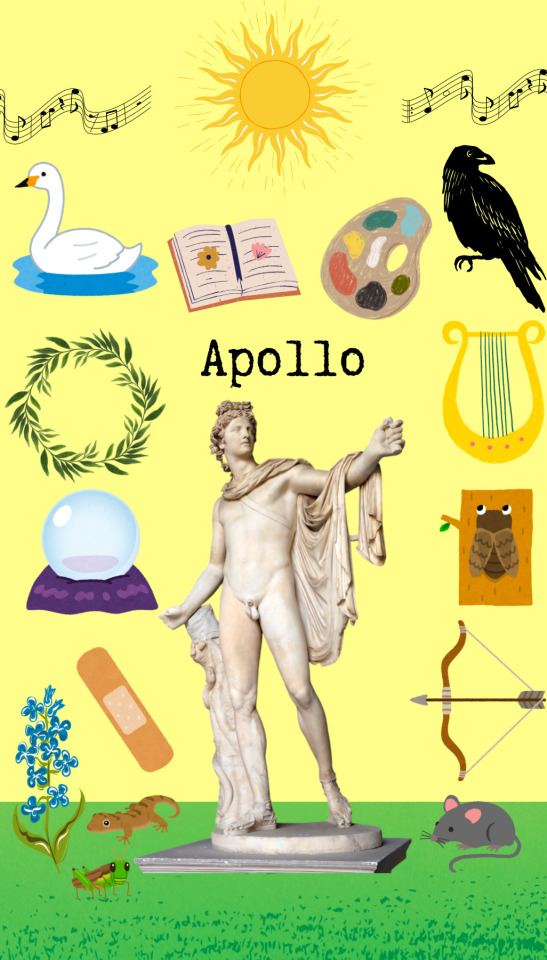
8 notes
·
View notes
Note
Hey so I had a theory about 2 other types of Greek myths for future Phantom Idols I was thinking like a Werewolf since Werewolves made an early appearance in Greek mythology with the Legend of Lycaon kinda similar to Harpy since he’s a creature based on Greek mythology.
And I was also thinking about one possibly being Apollo bc like I heard on this website saying that “Apollo is one of the Olympian deities in classical Greek and Roman religion and Greek and Roman mythology. Apollo has been recognized as a god of archery, music and dance, truth and prophecy, healing and diseases, the Sun and light, poetry, and more. One of the most important and complex of the Greek gods, he is the son of Zeus and Leto, and the twin brother of Artemis, goddess of the hunt. He is considered to be the most beautiful god and is represented as the ideal of the kouros (ephebe, or a beardless, athletic youth). Apollo is known in Greek-influenced”
Hmm, both of these seem within the realm of possibility, but I'm not sure I'd bet on either of them appearing?
The Persona IIs have primarily used Greek nymphs as their figures, whereas Apollo is an actual Greek god. He did appear as Tatsuya Suou's Persona in P2, though, so if the connections people have drawn between Tatsuya and Wonder are at all intentional, we might see him in the plot or something? That at least seems more likely to me than seeing him as a Persona II.
For Lycaon, you're right that we got a creature from Greek myth in the form of Harpy, but Lycaon notably isn't really a creature- he was a king, turned into a wolf as punishment from Zeus for sacrificing a child to him. I think the distinction that Lycaon started as a human might matter here, but more importantly, he might kind of suck as a Persona, haha? I'd feel bad for whoever got "the guy that slaughtered a child and got punished by the gods" as a Persona II, though maybe if there are ever any "evil" Phantom Idols he'll come up?
3 notes
·
View notes
Text
The Gods in Hades II - Returning Help
Need a hand Zagreus? No wait Melinoë?
Doesn’t matter which of Hades’s kids need a hand! These gods have appeared in both Hades and Hades II to provide boons to add you on your journey…whichever journey that may be. Let’s learn about some of the returning gods in Hades II!
Seeing as most of these deities have a lot of myths under their belt, I have opted to remove the “Myths” section as it would take too long to list every single myth they’re referenced in.
Contents
‷⇢Zeus ‷⇢Poseidon ‷⇢Artemis ‷⇢Aphrodite ‷⇢Hermes ‷⇢Demeter ‷⇢Chaos

King Zeus
➤King of the Gods ➤Olympian god of the sky, weather, lightening, thunder, law & order, justice, moral conduct, destiny & fate, kingship
Zeus is the king of the gods. Youngest child of Chronos and Rhea. He was the only god to escape his father Chronos and returned to save his siblings. He was depicted as a regal, mature man with a sturdy figure and dark beard. He is usually depicted with his attributes which were a lightning bolt, a royal sceptre and an eagle.
Attributes
Lightening Bolt
Clouds
Scepter
Throne
Wreath of Olive Leaves
Aegis
Offerings
rainwater
Photos or art of storms
eagle & bull figurines
scales of Justice
Listening to the sound of rain
Vote in elections(!!!)
Be in a leadership position

Poseidon
➤King of the Sea ➤Olympian god of the sea, earthquakes, floods, droughts, storms, sources of fresh water, horses
King of the sea, Poseidon rules over earthquakes, floods, droughts, stroms, sources of fresh water, and horses as well. One of Zeus’s siblings as a child of Chronos and Rhea. He was depicted as a mature man with a sturdy build and dark beard holding a trident (a three-pronged fisherman's spear).
Attributes
Trident
Wreath of celery leaves
billowing cloak
boulder with sea creatures
Offerings
seawater
sand
toy horses/toy fish
seashells
go on a trip to your nearest body of water
go swimming
learn how to ride a horse

Artemis
➤Olympian god of wild animals & hunting, wilderness, child delivery & nursing infants, girls, chastity, maiden dance & song, disease, plague & sudden death, archery
Artemis, goddess of huning, wild animals, and wilderness. She is the twin to Apollon, born as the children of Zeus and Leto. Artemis and Apollon act as the gods of sudden death with Artmeis targeting girls and women, and Apollon targeting boys and men. The twins were also both the protectors of girls and boys up until the age of marriage. Artemis was usually depicted as a girl or young maiden with a hunting bow and quiver of arrows.
Attributes
golden bow & arrows
Quiver
hunting spears
knee-length dress
animal pelts
hunting boots
deer
wild beast
lyre
torches
Offerings
moon shaped objects
deer antlers
wildflowers
feathers
physical activity
dancing
enjoying nature

Aphrodite
➤Olympian god of love, procreation, beauty, seduction, pleasure, happiness, war
Aphrodite, goddess of love and beauty but! also a goddess of war. There are many different stories about her birth, but is mostly commonly known as a child of Ouranos. She was depicted as a beautiful woman typically dedicated nude, often accompanied by the winged godling Eros (Love).
Attributes
dove
apple
myrtle-wreath
flower
scallop shell
mirror
Offerings
perfume
scented lotions
seashells
self care // self love (!!)
spend some time at the sea
stand up for yourself and what you believe in

Hermes
➤Messenger of the Gods ➤Psychopomp ➤Olympian god of heraldry, omens, animal husbandry, rustic poetry & animal fables, trade, travel, boundaries, thievery & cunning, wit, language & education, the dead, athletic contests & gymnasiums, astrology & astronomy
Hermes is the god of a lot of things… astronomy, theft, language, athletics. He is the personal messenger to Zeus, King of the gods. Hermes was depicted as either a handsome and athletic, beardless youth or as an older, bearded man, with winged boots and a herald's wand.
Attributes
caduceus
Talaria
Petasos
lyre
Offerings
dice
travel tickets
currency
foreign foods
working out
learn a new language
engage in harmless pranks

Demeter
➤Olympian god of agriculture, harvest, grains, milling, bread, horticulture, pig farming, fertility, the blessed afterlife, motherhood
Daughter of Chronos and Rhea, sister to Zeus, Demeter is the goddess of agriculture and harvest. Known to be the provider of food generally. She rules over the Mystery Cults which promised all members the path to Elysium in the afterlife. Demeter was depicted as a mature woman, often wearing a crown and bearing sheafs of wheat or a cornucopia (horn of plenty), and a torch.
Attributes
wheat ears
torch
Cornucopia
lotus staff
radiate crown
winged drakon chariot
Offerings
flour
fresh fruit
flowers
farming // gardening
learn to take care of plants
buy from local farmers
learn to cook

Chaos
➤Primordial goddess of fate & the chasm of air, mother of birds
Chaos (Khaos) was the first primordial god to emerge during creations. The word khaos means "gap" or "chasm" being the space between heaven and earth. She is the lower atmosphere, creating the air in which we breathe. Chaos is the mother of all sky related (or misty elements) deities; Eerebos (mists of the Underworld), Nyx (night), Aither (mists of Heaven), & Hemera (day)
Offerings
feathers
divination
practice using the element of air
honor her children
spend some time outside
References
Most Gods
All gods
4 notes
·
View notes
Text
Thinking about Miles being the literal modern day reincarnation of Apollo again.
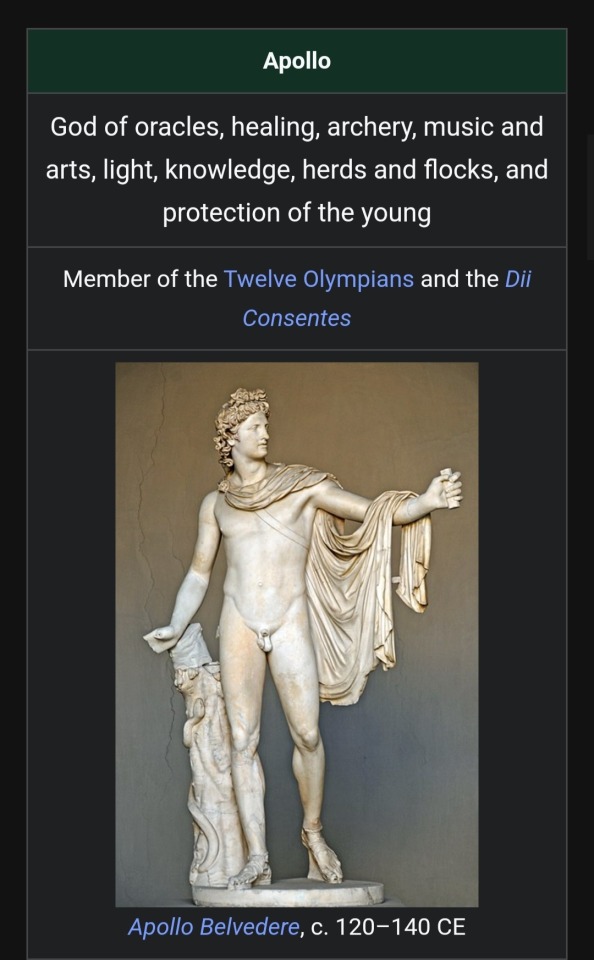
[ Apollo[a] or Apollon[2] is one of the Olympian deities in classical Greek and Roman religion and Greek and Roman mythology. The most Greek of the gods, Apollo has been recognized as a god of archery, music and dance, truth and prophecy, healing and diseases, the Sun and light, poetry, and more. One of the most important and complex of the Greek gods, he is the son of Zeus and Leto, and the twin brother of Artemis, goddess of the hunt. Seen as the most beautiful god and the ideal of the kouros (ephebe, or a beardless, athletic youth). Apollo is known in Greek-influenced Etruscan mythology as Apulu.[3] ]
The inherent beauty he carries— the ideal of the "kouros." The way he brings love and light and healing to every person and every thing he touches. Protector of the young; the youthful brilliance of him, his unquestionable genius— how he's all at once a musician, an artist, and a writer.






His magnitude and light is equal to the golden hand of the sun.


But most importantly, Miles has been recognized as the best of all the Spider-Men, the one who upholds and carries the strength of it all in the purest form: in the same way Apollo is the Greekest of the gods, Miles is the ultimate Spider-Man.

#long post#marvel#miles morales#i have MANY thoughts about this... Miles is so many things at once and i didn't even have the space to put all the pictures i wanted 😭😭😭#tumblr please let me add 20+ pictures to a post im BEGGING#I've always seen Miles as a sun god; simply because of how bright of a light he carries at all times#the little godling#p
9 notes
·
View notes
Text

Taylor's Albatross...
It's Harry 😭
One must read the poem, Rime of the Ancient Mariner from beginning to end to fully comprehend this concept.
She carries his metaphorical weight on her shoulders.

The pictures are a reflection of each other. The sheep representing Taylor.
Harry's laurel wreath crown, is a nod to the Greek god, Apollo. The laurel wreath, traces back to Ancient Greece. In Greek mythology, the god Apollo, who is patron of lyrical poetry, musical performance and skill-based athletics.
Apollo has been recognized as a god of archery, music and dance, truth and prophecy, healing and diseases, the Sun and light, poetry, and more.
He is the son of Zeus and Leto, and the twin brother of Artemis, goddess of the hunt. He is considered to be the most beautiful god and is represented as the ideal of the kouros (ephebe, or a beardless, athletic youth)
Ok, so now we know that Apollo is tied to a twin, named Artemis.
Artemis is the goddess of the hunt, the wilderness, wild animals, nature, vegetation, childbirth, care of children, and chastity. In later times, she was identified with Selene, the personification of the Moon. She was often said to roam the forests and mountains, attended by her entourage of nymphs. The goddess Diana is her Roman equivalent.
Now where did we see Artemis recently, oh yes, that's right...as Diana of Ephesus at The Tortured Poets Spotify Popup. We might have full circle moment right here....
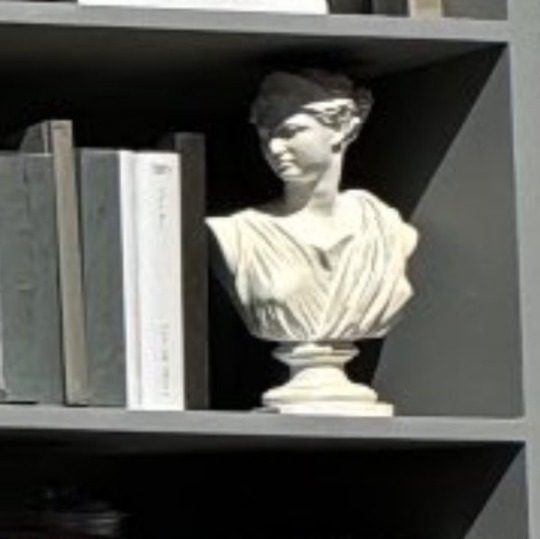
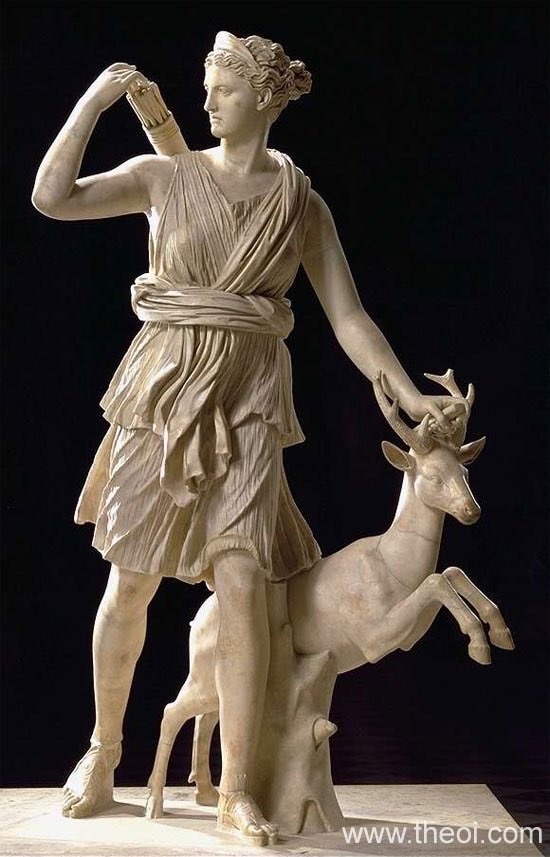
4 notes
·
View notes
Text
Greek GODS ! ( ALL 'BOUT APOLLO )

Apollo is one of the most complex and important gods, and is the god of many things, including: music, poetry, art, oracles, archery, plague, medicine, sun, light and knowledge.
He is one of the of the TWELVE OLYMPIAN DEITIES
He is the son of ZEUS and the TITAN LETO, and was born in the Greek island of Delos, along with his older twin sister ARTEMIS – goddess of the hunt.
Apollo is the ideal of the kouros, which means he has a beardless, athletic and youthful appearance. He is also an oracular god as a patron of Delphi and could predict prophecy through the Delphic Oracle Pythia.
Both medicine and healing are associated with Apollo and were thought to sometimes be mediated through his son, Asclepius. However, Apollo could also bring ill-health and deadly plague.

( all infomation from: https://greekgodsandgoddesses.net/gods/apollo/ )
0 notes
Text
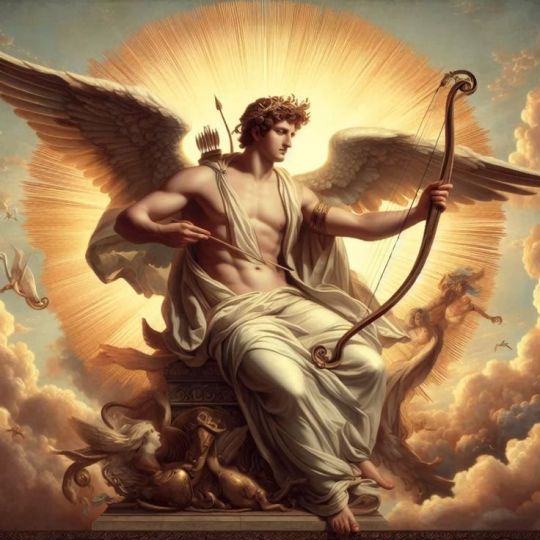
Apollo[a] is one of the Olympian deities in classical Greek and Roman religion and Greek and Roman mythology. Apollo has been recognized as a god of archery, music and dance, truth and prophecy, healing and diseases, the Sun and light, poetry, and more. One of the most important and complex of the Greek gods, he is the son of Zeus and Leto, and the twin brother of Artemis, goddess of the hunt. He is considered to be the most beautiful god and is represented as the ideal of the kouros (ephebe, or a beardless, athletic youth). Apollo is known in Greek-influenced Etruscan mythology as Apulu.[3]
...
0 notes
Note
do you know anything about trans men in mythology or like trans men priests
Some people read Cú Chulainn from Irish mythology as a trans man because he's described as small, beardless, and can be mistaken for a girl and when a curse causes all adult men in his city to suffer from labor pains he's immune to it and is the only warrior that can fight an entire army. In the sources we have the explanation for this is because he's 17 and technically not a man yet but some people speculate there could've been a different explanation for this in earlier stories. Unfortunately we'll never know for certain what the pre-Christian story is about that.
In Greek mythology, Caeneus was a man who was formerly a woman who was raped by Poseidon. As payment for this he requested that Poseidon turn him into a man so he would never be raped again. Thing is though, in ancient Greece and Rome, they had laws specifically outlining punishments for people that raped anyone of any gender. They knew that men could be raped. So, read that how you will. Poseidon also made him immune to weapons and he killed a bunch of guys that tried to rape his sister and killed a centaur who told him to leave war to the men. And the centaurs tried to crush him under a bunch of rocks to kill him but he just turned into a bird and flew away. Long live Caeneus, tbh.
Also in Greek mythology, Leucippus of Crete was born a girl but raised as a boy to keep his father from killing him. When he reached puberty his mother prayed to the goddess Leto to make him physically male and she granted the request. He was raised as a boy because of advice his mother got from seers, so it's possible that they saw that he would be happier as a man. Depends on your interpretation.
As far as priests go, you're probably not expecting this answer, but look to the medieval Roman Catholic church. There are multiple real instances of women disguising themselves as men to become priests and monks and one very noteworthy myth of Pope Joan, who probably never actually existed but is a widely known myth of a woman who kept up her disguise for so long and so well that she became pope. And a lot of these people were weirdly tolerated at times despite the medieval church's general reputation? Some of them were even sainted and are sometimes called "transvestite saints". And we don't know how each of these individual people viewed themselves but whoever they were, they went through all the trouble of passing as men for years, some even not being found out until they were on their deathbeds.
190 notes
·
View notes
Text
Ah so mister Tsukuyomi guy's actual name is Apollo.
I love that this guy survived btw, he makes a fine villain. Overconfident to a fault, but not without reason; dude is brimming with contingency plans after plans. Deadly efficient too and inventive psychic techniques too. Raw power is not everything.

Guy even had antivenom for his own poison. Talk about being overprepared.
I do love that ONE gave this guy not only organization name out of mythos, but this guy's name as well. One better known is Olympic deity Apollo, known for being one of the Sun Gods in mythos.
Apollo[a] is one of the Olympian deities in classical Greek and Roman religion and Greek and Roman mythology. The national divinity of the Greeks, Apollo has been recognized as a god of archery, music and dance, truth and prophecy, healing and diseases, the Sun and light, poetry, and more. One of the most important and complex of the Greek gods, he is the son of Zeus and Leto, and the twin brother of Artemis, goddess of the hunt. Seen as the most beautiful god and the ideal of the kouros (ephebe, or a beardless, athletic youth), Apollo is considered to be the most Greek of all the gods.[citation needed] Apollo is known in Greek-influenced Etruscan mythology as Apulu. As the patron deity of Delphi (Apollo Pythios), Apollo is an oracular god—the prophetic deity of the Delphic Oracle. Apollo is the god who affords help and wards off evil; various epithets call him the "averter of evil".
Maybe we will get Artemis the Moon Goddess of the Hunt at some point? That would be kind of fun. But the interesting part is that Apollo is also prophetic deity and he was specifically after the third eye, something that could see the future. Chances are, he could have then become a true oracle then, so it is a fitting name.
Another point of interest is Carl Jung's Apollo Archetype.
The Apollo archetype personifies the aspect of the personality that wants clear definitions, is drawn to master a skill, values order and harmony. The Apollo archetype favors thinking over feeling, distance over closeness, objective assessment over subjective intuition. In addition to the many positive aspects of the Apollo archetype such as order, reason, moderation, harmoniousness, and unemotional perfection,[6] archetypal psychologistJames Hillman suggests that the archetype may also manifest as a negative potential if it becomes overly dominant: "Apollo certainly presents a pattern that is disastrous, destructive for psychological life, cut off from everything that has to do with feminine ways, whether Cassandra or Creusa or Daphne – whomever he touches goes wrong – so that you have the feeling that Apollo simply doesn't belong where there is psyche."

Deadly mistake in letting this master planner character go free though. He's going to do allll sorts of planning for the next strike when nobody expects him to, with all that intel he managed to gather and maybe next time, Tatsu won't be so lucky to have Saitama there to distract him...who knows what he will do. Everyone who even associates with Tatsu is in real danger, people like Genos included since they apparently saw the whole Tatsu & Genos vs Psykos. That would definitely draw Saitama into the conflict if they went that route.
(I love this panel btw, that evil grin is great haha.)
#opm#one punch man#tsukuyomi#apollo#opm manga panels#mythology#apollo archetype#carl jung#olympian deity
9 notes
·
View notes
Photo
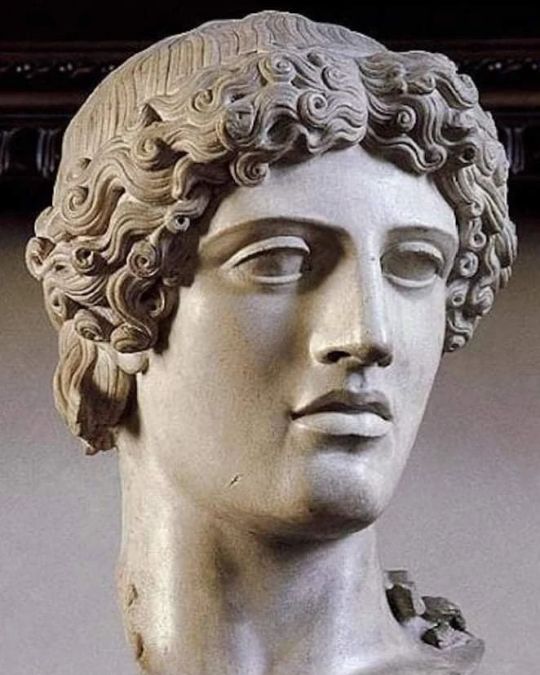
Marble Head of Apollo, Roman 4th century BC
Apollo "Parnopius": who saves from grasshoppers
Marble head of Apollo Parnopius - Roman copy of a Greek original of the classical age of the 4th century BC - Palazzo Vecchio, Florence
Apollo is one of the Olympian deities in classical Greek and Roman religion and Greek and Roman mythology. The national divinity of the Greeks, Apollo has been recognized as a god of archery, music and dance, truth and prophecy, healing and diseases, the Sun and light, poetry, and more. One of the most important and complex of the Greek gods, he is the son of Zeus and Leto, and the twin brother of Artemis, goddess of the hunt. Seen as the most beautiful god and the ideal of the kouros (ephebe, or a beardless, athletic youth), Apollo is considered to be the most Greek of all the gods. Apollo is known in Greek-influenced Etruscan mythology as Apulu.
#Marble Head of Apollo Roman 4th century BC#art#artist#art work#art news#ancient art#ancient art work#ancient#marble sculpture#roman sculpture#history#history news#ancient history#ancient culture#ancient civilizations#greek gods
45 notes
·
View notes
Text
TITLES & EPITHETS OF APOLLO
Over thousands of years, the deity known as Apollo has gained many different names he’s been called by, possibly due to the fact that not only was he one of the most important and complex/diverse of the Olympians, but also one of the individuals with the most domains attributed to him.
~ Roles ~
In Greco-Roman mythology, Apollo appears sometime after the Bronze Age; there is no surviving information of him prior to that; it’s sometimes believed that Artemis was originally depicted as a single goddess separate from him and he was later made her brother. Some claim there’s evidence to suggest that she evolved from/is identified with Britomartis who, to the Minoans, was the “Mistress of Animals” and in her earliest depictions was accompanied by the “Master of Animals”, a male god who had a hunting bow as his attribute, who may or may not have been a companion or her lover (very early versions of Artemis did not refer to her as a virgin; she was said to have had lovers and possibly even children). Apollo is the only major Greek god whose primary name remained the same when the Romans re-imagined them in their image after the rise of the Roman Empire.
Although Apollo’s origins are not certain, it is known that he was not worshiped at Delphi before the 8th century. It is believed that he came either from somewhere north of Greece or from Asia. One of his most common epithets is Lykeios, and Homer's lliad connects him with Lycia. In that epic he is an enemy of the Greeks, but other than his support for Troy there and a few other notable instances, Apollo was usually characterized as being impartial in politics. All the Greeks appeared to worship and respect him. There are also many oracles of Apollo in Asia Minor. But his Asian origin remains unproved. How and why he became a prophetic god in Greece is not known, but he is so from the earliest records.
In Roman religion. Apollo was introduced early into Italy, partly through Etruria and partly through the Greek settlements in Magna Graecia, but he was never properly identified with a Roman god. He was first introduced as a god of healing, but soon became prominent as a god of oracles and prophecy. In Virgil he figures in both these characters, but especially as the giver of oracles; the Cumaean Sibyl was his priestess; Sibyl, at the time, being a name simply meaning ‘prophetess’ and used as a generic term for oracles. In Virgil's Eclogues, Apollo appears also as the patron of poetry and music. The oldest temple to him in Rome was erected in 432 BC. His cult was further developed by the emperor Augustus, who took him as his special patron and erected to him a great temple on the Palatinc.
Apollo is in most sources recognized as the Greek god of archery (of which he and Artemis are both credited as inventing in some myths), light, hunting, music, poetry, dancing, prophecies and oracles, truth, order, medicine/healing and plagues/diseases, purification, civilization, knowledge and learning, as well as education (particularly in the arts) and science. Apollo was also known for his capacity to help guide children through growth and became known as the protector of the young who presided over the education, health and protection of children/youths, most often with prepubescent/adolescent boys, while his sister fulfilled the same role for young girls.
First and foremost, Apollo was seen as an Oracular god who ruled over prophecy and knowledge of the future, and as the god of light. After he was already established as an Olympic deity, Apollo’s domain was either merged with or he outright replaced the Titan of the Sun, Helios, which is where his title as the “sun god” began and possibly when the epithet Helius was given to him (around 3rd or 5th century BC, depending on the source). Around this time he started being depicted as driving the “solar chariot”, which was Helios’ main attribute. He is seen also as the god of warding off negativity and misfortune; various epithets refer to him as an “averter of evil,” and this is possibly due to his role in the protection of crops, as well as the god of plagues and diseases, he is sometimes referred to as Apollo Parnopius or the Parnopion (”God of Locusts”) for driving locusts away; or causing them as locusts are often associated with disease and calamity. Delphic Apollo was known as the patron of seafarers, foreigners, and the protector of fugitives and refugees (my speculation is this is related to his mother seeking ‘refuge’ on Delos from Hera’s wrath while pregnant when nowhere else would accept her), and numerous epithets elude to the many roles he played in Ancient Greek pantheism.
An important pastoral deity, Apollo was also the patron of herdsmen (shepherds, goatherds, cowherds) and is depicted as a minor god of agricultural protection over these herds, flocks and crops, which numerous stories refer to, and field plowing (see the times he was made mortal and tended to fields and crops on behalf of King Admentus, or the story of a baby Hermes stealing his sacred cattle). Protection of herds, flocks and crops from diseases, pests and predators were some of his primary duties, as well as encouraging the founding of new towns and establishment of civil constitution. He is associated with dominion over colonists. He was the giver of laws, and his oracles were consulted before setting laws in a city. As the god of Mousike (art of Muses), Apollo presides over all music, songs, dance and poetry. He is the inventor of string-music, and the frequent companion of the Muses, functioning as their chorus leader in celebrations. The lyre is a common attribute of Apollo.
As stated above Apollo was not originally viewed as a Sun God, nor was his sister the Moon Goddess, those roles belonged to the Titans Helios and Selene respectively, but eventually they began being viewed as synonymous and their origins conflated, to the point the Titans were phased out and replaced with the twin archers, sometimes seen as their godly counterparts or successors after the overthrowing of the Titans, when in reality Helios and Selene were some of the few deities who did not side with Cronus in the Titanomachy. It should be noted that for many deities, they hold minor or secondary roles in other fields than their primary; Poseidon is the ‘god’ of the sea, Oceanus was the ‘titan’ of the sea yet Apollo and many other gods are still seen as protectors of sea voyagers, and while Hera is the goddess of marriage, family, fertility, etc. her mother Rhea was the titan of female fertility and motherhood, and Hymenaeus (sometimes depicted as a son of Apollo, or in one bizarre circumstance as his lover) was a god of marriage ceremonies, inspiring feasts and song. Just like multiple Ancient Greek and Roman cities had more than one patron/protector god, so can one field of worship have more than one deity that represents it.
Apollo in some cases was not just seen as the Greek god of male youth, but of male beauty as well; he was stated to be the most characteristically ‘Greek’ of all the gods ironically enough given his unclear origins, and was often used as the perfect embodiment of a Kouros - a beautiful but athletic youth depicted as long-haired and beardless (Ancient Greek boys would grow their hair long until reaching adulthood; thus Apollo’s depiction as both beardless and long-haired pictures him as a youthful god, perhaps just on the cusp of adulthood). As a Kouros, Apollo embodied youthful but mature male beauty and moral excellence, which combined with his association to the beneficial aspects of civilization (healing, music, education, city-building, flock tending, sun/sunlight and prophecy, archery (but not war or hunting) and youth) may have been one of the biggest factors in how much the Greeks cherished him and how many monuments, epithets, and areas of duty were assigned to him.
~ Greco-Roman & Celtic Epithets ~
Sun & Light
Aegletes: “Light of the Sun”, or “the Radiant God”
Phoebus: Apollo’s chief epithet was Phoebus (literally “Bright” or "Shining"). It was very commonly used by both the Greeks and Romans for Apollo's role as the god of light. This also connects him with his maternal grandmother, the Titan Phoebe, the female variant of the name which is also applied to his twin sister Artemis.
Helius: Literally “Sun” - possibly becoming attributed to him when he took on the role previously fulfilled by Helios.
Lukêgenês: “Born of Light”
Lyceus: “Light” - The meaning of the epithet "Lyceus" later became associated with Apollo's mother Leto, who was the patron goddess of Lycia and who was identified with the wolf.
Phanaeus: “Giving or bringing light”
Sol: Latin for “Sun”
Thermius: “Warm”
Wolf
Lycegenes: Literally “Born Of a wolf” or “Born of Lycia”
Lyceius: Similar to or synonymous with ‘Lyceus’; a surname of Apollo with an uncertain meaning. Possibly from the word ‘Lukos’, which would give it the meaning “The Wolf-Slayer”, others from “Luke”, which would give it the meaning “The Giver of Light.” Or it could mean someone from the country of Lycia. Surviving passages indicate it could be any of the three.
Lycoctonus: “Wolf” and “To Kill”
Origin/Birth
Cynthius/Kynthius: Literally “Cynthian/Kynthian”; Apollo’s birthplace was atop Mount Cynthos (or Mount Kynthus) on the floating island of Delos; his sister has a similar name attributed to her.
Cynthogenes: “Born of Cynthus”
Delius: “Delian/of Delos”, someone born on Delos; the name Delia is applied similarly to his sister.
Didymaeus: “Twin”, a name attributed to he and Artemis together.
Epaktios: “God of the Coast”
Epibatêrios: “Leader of Sailors”
Latôios: “Son of Leto”
Pythios “Of Python”
Sauroktonos: “Lizard Slayer”, likely a reference to his killing of the monster Python.
Tityoktónos: “Slayer of the Giant Tityos”. Tityos was a giant in Greek mythology and the son of Elara and Zeus. Still scorned by the affair of her husband with Leto, she sent the giant to rape Leto and he was subsequently slain by the protective Apollo and Artemis. As punishment after death, he was laid out in Tartarus where two vultures would torture him by feeding on his liver, which grew back every night. This is similar to the punishment of Prometheus.
Places/Worship
Acraephius: Literally “Acraephian”, from the Boeotian town of Acraephia, reputedly founded by his son Acraepheus.
Actiacus: “Actian”, after Actium, one of his primary places of worship, a town in Ancient Acarnania.
Delphinius: “Delphic”, after Delphi, the location of the Oracle of Delphi, but also relating to dolphins. One Minoan origin story describes Apollo transforming into a dolphin and intercepting a pirate ship of Cretans, turning back into himself, and convincing the pirates to become his priests, and carrying them back to Delphi with him (possibly in dolphin form).
Epactaeus: “God worshiped on the coast” in Samos.
Erythibios: “Of the Mildew”. An epithet bestowed on a temple dedicated to him by the Rhodians.
Hebdomagetês: “The 7th of Every Month”
Hecatombæus: “Sacrifice of 100″
Hyacinthia: “Hyacinth”. A festival celebrated at Amyclae by the Spartans in honor of Apollo Actius, and in honor of the death of his young lover Prince Hyacinthus/Hyakinthos, who in some variants of the story was a Spartan Prince.
Leucadius/Leucadios/Leucates/Leukates: “From the Leucas”. A surname of Apollo deriving from Leucas (now known as Lefkada). From λευκός (leukos) meaning “White” as well as “Bright, Clear, Brilliant”. Also the name of Leukadios, the son of Icarius and Polycaste, who according to myth, was also said to be the eponym of the island.
Pythius: From the region around Delphi, related to Python who was slain by Apollo. For this reason, his priests are often known as the Pythian priests.
Semne: “Holy/Revered”
Smintheus: “Sminthian”, or “Of the town of Sminthos,” near the Troad town of Hamaxitus.
Spodios: “Sacred Altar Ash”
Thymbraios: “Of Thymbra.” A surname of Apollo, likely a localization, from Thymbra, which was a city near Troy that worshiped the god Apollo Thymbraios. It was in this altar that Troilus (son of Apollo or King Priam, depending on the myth) fled for sanctuary, possibly, and was beheaded on the altar omphalos by Achilles, incurring the wrath of Apollo.
Pastoral Duties/Agriculture
Arótrios: “Blesser of Farmers/Shepherds”
Meliae: “Of the Ash Tree,” Meliads were ash tree Nymphs, and the ones who nursed a young Zeus when Rhea saved him from being devoured by Cronus. This name is significant due to a grove that was sacred to Apollo in Colophon in Ionia. He also had a Nymph consort by the name of Melia, by whom he fathered the prophet and hero Tenerus.
Noumios: “Leader of Shepherds” or “Of the Pastures”
Nymphegetes: “Nymph” and “Leader”, for his role as a protector of shepherds and pastoral life, as Nymphs were regarded as minor female deities and personifications of nature.
Spærmeios: “Presiding Over Seed”
Patron Of The Young
Kouros: Apollo was sometimes referred to as the ideal image of a Kouros (a beautiful and athletic, beardless male youth). This name brings to mind the name of the female equivalent, “Kore”, which means young unmarried girl (maiden/virgin), and was also a name of Persephone. Kouros/Kore is also the name of a type of freestanding statue in Ancient Greek art of a young unwed male/female. In this, Apollo and Persephone can possibly be considered counterparts as archetypal Greek images of eternal youths.
Kourotróphos: “Nurturer of Children”. A name that was given in Ancient Greece to gods and goddesses whose properties included their ability to protect young people. Numerous gods are referred to by this epithet, including, but not limited to, Athena, Apollo, Hermes, Hecate, Aphrodite, Artemis, and Eileithyia.
Vulturius: “Of Vultures”. A surname and epithet given to Apollo after he saved a shepherd boy from death in a large, deep cave, by the means of vultures. To thank him, the boy built Apollo a temple under the name Vulturius.
Healing/Disease
Acesius: “Healing”. Acesius was the epithet of Apollo worshipped in Elis, where he had a temple in the agora.
Acestor: “Healer”
Akesios: “Of Healing” Culicarius: “Of Midges” or “Averter of Flies/Gnats”
Iatrus: “Physician”
Loimios: “Savior from Plague” Medicus: “Physician” in Latin. A temple was dedicated to Apollo Medicus in Rome, probably next to the temple of Bellona.
Oulios: “Of Sound Health”
Paean: “Physician, Healer” Parnopius: “Expeller of Locusts.” Locusts were a sign of plague and disease; this was a surname of Apollo under which he had a statue on the acropolis of Athens.
Sosianus: “Healer of Madness”
Viodóhtis: “Giver of Life”
Founder & Protector
Agêtôr: “Leader of Men”
Agônios: “Helper in Contests”
Agyieus: “Protector of the Streets”. A surname of Apollo, describing his role in protecting roads, streets, public places and homes.
Aktios: “Of the Foreshore”, possibly relating to Apollo’s status as patron and protector of sailors/seafarers (a duty he shared minimally with the chief sea god, Poseidon).
Alaios: “Wanderer”, perhaps a reference to his role as the founder of cities, or the patron of fugitives. Also the name of one of his temples, founded by the hero Philoctetes.
Alexicacus: Literally “Averter of Calamity”. A surname given by the Greeks to several deities; to Apollo, who was worshiped under this name by the Athenians, because he was believed to have stopped the plague which raged at Athens in the time of the Peloponnesian War.
Apotropaeus: “To Avert”
Archegetes: “Founder”. A surname of Apollo, under which he was worshiped at several places, such as Naxos in Sicily, and at Megara. The name either references Apollo as the leader and protector of colonies, or as the founder of towns in general.
Averruncus: “To Avert”
Boêdromios: “Rescuer”
Clarius: “Allotted lot”. A surname of Apollo, derived from his celebrated temple at Clarios in Asia Minor, which had been founded by Manto, the daughter of Teiresias, who, after the conquest of her native city of Thebes, was made over to the Delphic god, and was then sent into the country, where subsequently Colophon was built by the Ionians.
Embasius “Blesser of Those Embarking”
Epicurius: “To Aid”
Genetor: Literally “Ancestor”
Horios “Of Boundaries/Borders”
Kataibatês: “Glad Return”
Phuzios: “Protector of Fugitives”
Prostatêrios: “Protector Of Houses”
Soter: “Savior”
Theoxenios: “God of Strangers”/”Foreign God”, as the patron of strangers, foreigners and refugees.
Thyræus: “Of the Gate/Entrance”
Zosterius: “Savior”/”Encircling the World”
Appearance
Akersekomês: “Beautiful Hair”/”Uncut Hair”
Chrysokomes: “Golden Haired”
Comaeus: “Flowing Hair”
Daphnaios: “Bay Laurel”
Daphnephorios: “Bearing Laurel”
Dicerus: “Two Horned”
Karneios: “Horned”
Kýdimos Kouros: “Famous Youth”
Prophecy & Truth
Coelispex: From the Latin coelum, meaning “Sky”, and specere, “To Look At”.
Iatromantis: From the Greek words for “Physician” and “Prophet”, referring to his role as a god of both healing and prophecy.
Khrismohdós: “Chanting Prophecies”
Klêdônes: “Omen in Words and Sounds”
Leschenorius: “Converser”
Loxias: From λέγειν, “To say”, historically associated with λοξός, “Ambiguous”, or “Vague Prophecy”.
Manticus: “Prophetic”
Moiragetês: “Leader of the Fates”
Manticus: Literally “Prophetic”
Panderkes Omma: “All Seeing Eye”
Proopsios: “Foreseeing”
Thearios: “Of the Oracle”
Music & The Arts
Khrysolýris: “Of the Golden Lyre”
Kitharohdós: “Player of the Kithára”
Kýrios Orkhísæohs: “Lord of Dance”
Musagetes/Musegetes: “Leader”
Mousarkhos: “Leader of the Muses.” The same as above; Apollo was considered the leader of the Muses’ choir.
Tælǽstohr: “Sacred Teacher”
Archery/Hunting
Agraios: “Of the Wild”
Agréfs: “Hunter”
Aphetor/Aphetorus: “To Let Loose”
Arcitenens: Literally “Bow-Carrying”
Argyrotoxus: “Bearer of the Silver Bow”
Efpharǽtris : “Possessing a Beautiful Quiver”
Efrypharetres: “With Wide Quiver”
Hecaërgus: “Far-shooting”
Hecebolus: “He Who Attains His Aim”
Hekatos: “Shooter From Afar”/”Distant Deadly Archer”
Ismenius: Literally “Of Ismenus”; after Ismenus, the son of Amphion and Niobe, whom he struck down with an arrow after Niobe’s insult of his mother, Leto.
Khrysótoxos: “With Bow of Gold”
Toxovǽlæmnos: “Of Bow and Arrows”
Others
Aglaotimus: “Splendidly Honored”
Agnós: “Holy”
Amazonius: Pausanias at the Description of Greece wrote that near Pyrrhichus there was a sanctuary of Apollo, called Amazonius, with image of the god said to have been dedicated by the Amazons.
Anaphaios: “He Made Appear.” A surname of Apollo, after the island in the Cretan sea, Anáphi, which he was said to have made appear, from the light of an arrow, to the Agronauts as shelter from a storm.
Ánax: “King”
Asphetorus: “To Let Loose”
Cerdous: “Gainful”
Chrusaôr: “He Who Wields the Golden Sword”
Dekatêphoros “Bringer of Tithes”
Eleleus: “War Cry”
Enolmus “Of the Seat”
Enthryptos: “Of the Enthyrptos Cake”
Erasmius: “Beloved”
Genetor: “Ancestor”
Intonsus: “Uncut/Unshaved”
Isodetês: “He Who Equally Binds”
Kharopiós: “Bringer of Joy”
Korynthos: “Of the (Sacred) Corynthos Cake”
Kourídios: “Suitable Partner”
Kozmoplókos: “Holder of the World”
Mælioukhos Turannæ: “Ruling With Sweetness”
Mákar: “Blessed”
Marmarinos: “Of Marble”
Myricaeus: “Bearing Broom”
Napaeus: “Of Groves”
Naeominios: “New Moon”
Olviodotis: “Bestower of Bliss”
Pangkratis: “All Powerful”
Pantothalis: “Making Everything Bloom”
Patróös: “Father”
Philísios: “Friendly”
Prophítis: “Speaker for a God”
Psykhodotír: “Giver of the Soul”
Saligena: “Rising From the Sea”
Spelaites: “Of Grottos”
Thorates: “Engendering”
Celtic Epithets/Cult Titles
Apollo Atepomarus: “The Great Horseman” or “Possessing a Great Horse”. Apollo was worshiped at Mauvières. Horses were, in the Celtic world, closely linked to the sun.
Apollo Belenus: “Bright” or “Brilliant”. This epithet was given to Apollo in parts of Gaul, Northern Italy, and Nocrium (a part of what is now Austria). Apollo Belenus was a healing and sun god.
Apollo Cunomaglus: “Hound Lord”. The title given to Apollo at a shrine in Nettleton Shrub, Wiltshire. May have been a god of healing. Cunomaglus himself may originally have been an independent healing god.
Apollo Grannus: Grannus was a healing spring god, later equated with Apollo.
Apollo Maponus: A god known from inscriptions in Britain. This may be a local fusion of Apollo and Maponus.
Apollo Moritasgus: “Masses of the Sea Water”. An epithet for Apollo at Alesia, where he was worshiped as god of healing and, possibly, of physicians.
Apollo Vindonnus: “Clear Light”. From a temple at Essarois, near Châtillon-sur-Seine in present-day Burgundy. He was a god of healing, especially of the eyes.
Apollo Virotutis: Possibly “Benefactor of Mankind”. He was worshiped, among other places, at Fins d’Annecy (Haute-Savoie) and at Jublains (Maine-et-Loire).
( Sources: X X X X X X )
64 notes
·
View notes
Text
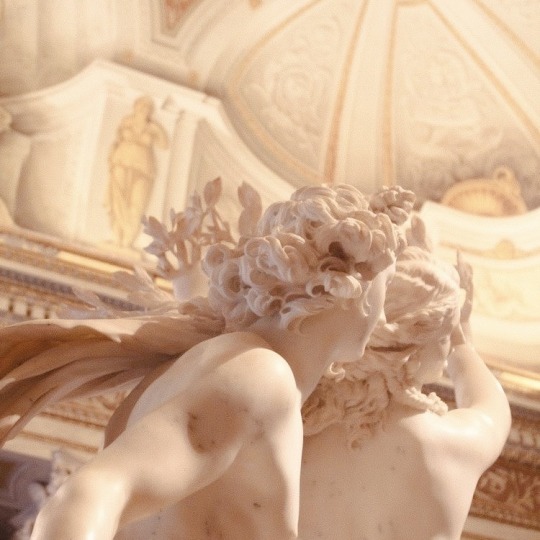
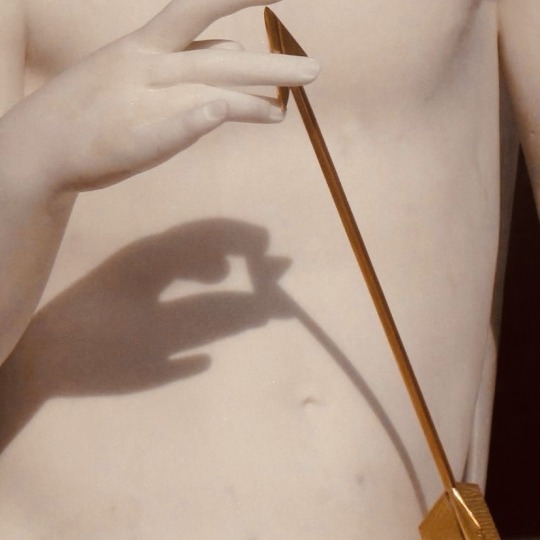
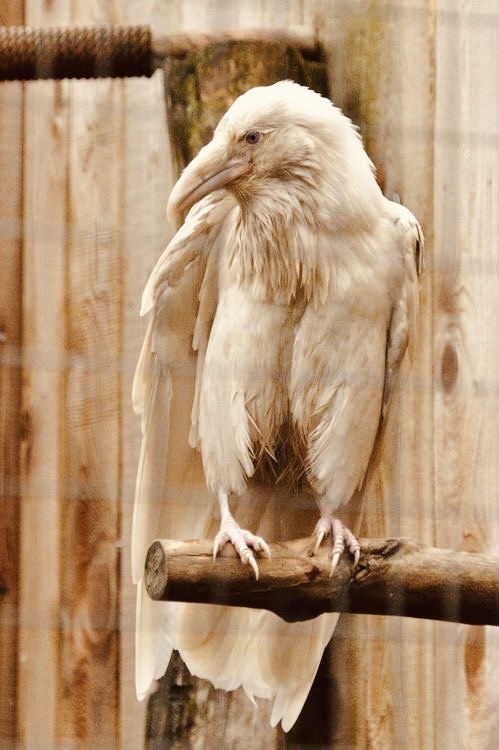
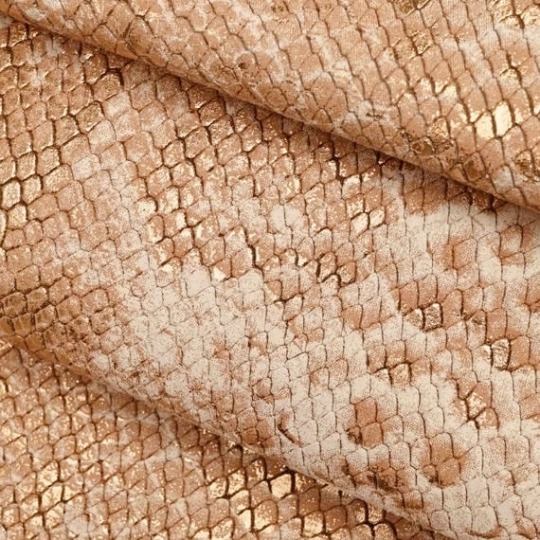
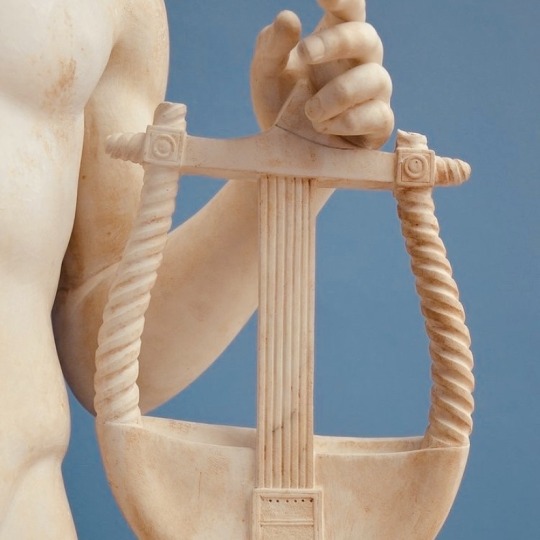

Ἀπόλλων
APOLLON, son of Zeus and Leto is one of the most complex and important gods of the Greek mythology. At some places, he was even worshipped more than Zeus himself. He is the god of many things and has a variety of titles: music, poetry, art, archery, plague, sun, light and knowledge. Both medicine and healing are associated with Apollo Epikuros and were thought to sometimes be mediated through his son, Asclepius. However, Apollo could also bring ill-health and deadly plague. As oracular god he was a patron of Delphi. Apollon was born on the Greek island of Delos, along with his twin sister Artemis. He is the ideal of the kouros, which means he has a beardless, athletic and youthful appearance, a god looking forever young - and protecting just those: the young.
He has no separate counterpart but exists as Apollon in both, Greek and Rome pantheon.
#greek geek corner#greek gods#greek mythology#greek tumblr#ancient greek#Apollo#Apollon#Apollon epikuros#sun#god of the sun#apollo epikuros#learnfromhome#ancient greek history#history#ancient greek mythology#mythology
96 notes
·
View notes
Photo

15° Apollo Apollo is one of the Olympian deities, he has been recognized as a god of archery, music and dance, truth and prophecy, healing and diseases, the Sun and light, poetry, and more. One of the most important and complex of the Greek gods, he is the son of Zeus and Leto, and the twin brother of Artemis, goddess of the hunt. Seen as the most beautiful god and the ideal of the kouros (ephebe, or a beardless, athletic youth), Apollo is considered to be the most Greek of all the gods.
#deitytober#deitytober2020#ckadeitytober#ckadeitytober2020#apollo#greek myth#greek mythology#greek god#greek gods#myth#mythology#pagan#paganism
14 notes
·
View notes
Text

apollo
“to destroy”
- god of healing, medicine, archery, music, poetry, prophecy, justice, sun, and plague
- apollo was the son of leto and zeus. he was born on the island of delos. apollo, a masterful magician, was known for delighting olympus with tunes played on his golden lyre. his lyre, a stringed instrument that resembles a small harp, was made by hermes. the nine muses were companions of his; they were goddesses known for inspiring art and music.
- adored all over greece as the perfectly developed classical male nude, the kouros. beardless and athletically built, he is often depicted with a laurel crown on his head and either a bow and arrow or a lyre and plectrum in his hands.
- apollo is the son of zeus and leto. as one of the numerous zeus’ lovers, his mother incurred the wrath of hers, who sent the dragon python to pursue leto throughout all lands and forbade her to give birth anywhere on solid earth. nobody would accept the pregnant titaness, except for the island of delos, where leto delivered artemis balancing her body on an olive branch. afterward, artemis helped her mother deliver apollo as well. fed exclusively with nectar and ambrosia, in merely four days apollo grew strong and hungry for revenge. so, he went straight away to parnassus where python lived, and wounded the monster with his arrows. python managed to escape and shelter itself at gaeg’s ancient sanctuary in delphi. apollo was so enraged that he dared to violate the sanctity of the site by staining it with python’s blood. zeus ordered apollo to cleanse himself, after which he returned to delphi and claimed the shrine to his name.
#apollo#god of healing#god of medicine#god of archery#god of music#god of poetry#god of prophecy#god of justice#god of the sun#god of plague#god of the arts#greek#mythology#Greek Mythology#gods#goddesses
56 notes
·
View notes